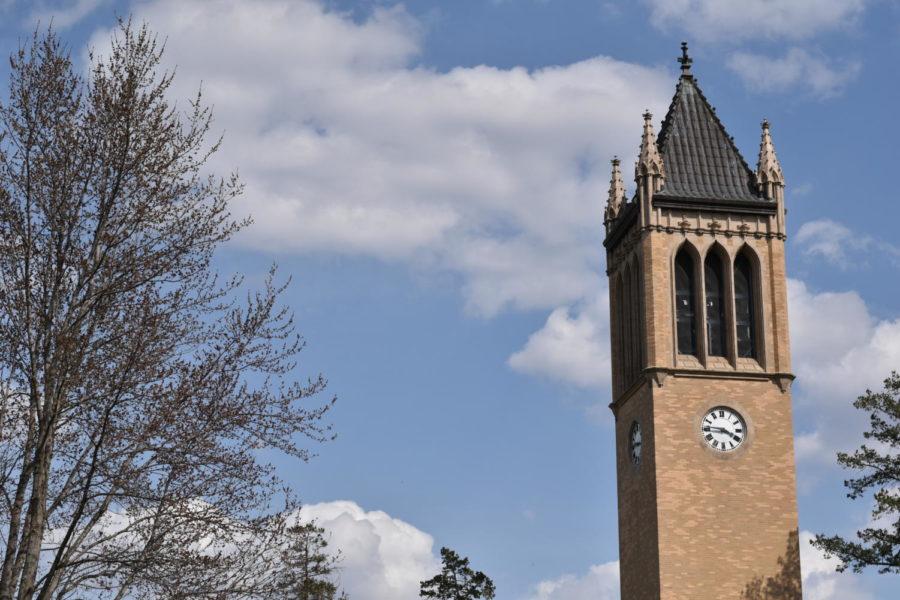Editorial: End of the year reflection
The Campanile rises against a blue sky on April 24, 2018.
April 24, 2018
This past year has been an eventful year. Here are some of the issues that we covered that have seen a positive improvement, and some issues that still need to be addressed.
Gun violence
The ISD Editorial Board talked extensively about gun violence after the Parkland shooting. We saw the March for Our Lives that tried to change the conversation around gun violence by banning military-style assault and asking for background checks when buying guns. We supported the march and continue to advocate for reasonable gun control.
However, there is still an enormous amount of work that needs to be done. Gun violence continues to be a polarizing topic that hasn’t seen a clear solution since Parkland. We still need to push our leaders to come together and come up with common sense gun control.
Sexual misconduct and #MeToo
This year we focused on raising awareness about the pervasiveness of sexual misconduct. We talked about the #MeToo movement and the power it gives survivors. We questioned why we are still blaming survivors of sexual assault for what happened to them. We looked at Iowa State’s new sexual misconduct training and felt it did a much better job than the previous one of placing blame on perpetrators, where it belongs. We discussed catcalling and how it’s simply not a compliment, but rather it’s harassment.
Leaders on campus need to continue or start taking this issue very seriously. No one should have to experience sexual violence or harassment. We must continue to place blame on perpetrators and support survivors. And most importantly, we need continuous, proactive education because everyone should know how to combat this issue.
Funding the Leopold Center
Recently the New York Times Magazine dedicated their issue to the question “Can dirt save the earth?”
First, any student in the College of Agriculture and Life Sciences will tell you that it is soil and not dirt. Second, there is already significant research, some of which was completed on this campus, indicating the soil’s ability to be a carbon sink. That is to say the carbon dioxide in the atmosphere that is acting as a greenhouse gas, can be trapped in the ground using the plant’s own photosynthesis and sustainable agricultural practices.
We cannot control the plant’s natural functions, but we can change our agricultural systems to be more sustainable for our local environments and the global climate. This requires organization and outreach efforts from a multifaceted institution that has the farmer’s best interests in mind. It requires the Leopold Center for Sustainable Agriculture.
Last year legislative Republicans voted to defund the Leopold Center and instructed Iowa State to close the center. Then Gov. Terry Branstad line-item-vetoed the part about closing the center, but the funding was still absent. This is an injustice that goes against our state values.
The Leopold Center helped fund graduate research at Iowa State that focused on making farms in Iowa and across the world more productive and sustainable. Then, they used that research to help farmers through extension and outreach. Now, with the major funding cuts by the state, the Leopold Center is forced to scale back to the detriment of Iowa farmers. Fully funding the center to protect Iowa’s farmers and environment should be the top priority for legislators next session.
Bias and prejudice
We also wrote on racial prejudices, discrimination and inequality prevailing in our society that needs to end now. Bias and prejudice towards the people of color, primarily the black, is still real and widespread in the society. Descriptions changed when it comes to color and different religious beliefs.
For instance, the deadliest mass shooting in the U.S. history, which happened last year was never pronounced “terrorism” because of color and a different religious belief. However, if that incident, god forbidden, was committed by any Muslim or an African-American, they must be quickly labeled as terrorism, and the right-wing nationalist would have reacted fiercely against them and have started a campaign to outlaw and degrade an entire ethnic group.
Moreover, recently we have witnessed the arrest of two black men at Starbucks who were waiting for a business associate. Such incidents are frequent in the U.S., and now being tremendously exposed due to potent social media that can help fight against racial discrimination, bias, and prejudice by bringing them into the attention of those who do not believe in it.
People of different ethnic backgrounds yet face discrimination in their own country because of inattention, woolgathering, and carelessness by the society in whole. Once the whole society raises voice against it, such prejudices and bias will end.
















